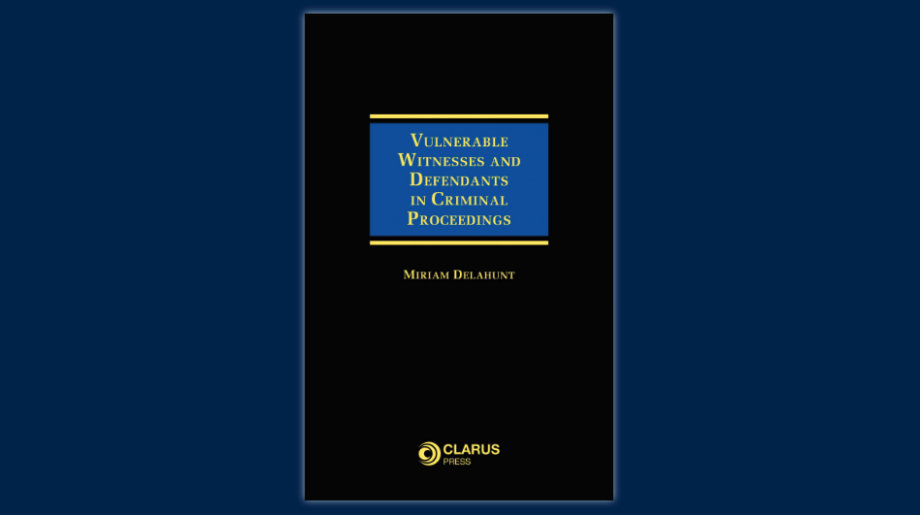
As the Department of Justice looks to establish a panel of intermediaries to assist vulnerable witnesses in criminal courts, questions are raised about its timing and efficacy. The adversarial nature of the justice system, coupled with the toll on legal practitioners, underscores the urgency of properly implementing necessary support measures.
In the article below, Miriam Delahunt BL outlines the role of intermediaries in facilitating communication for vulnerable witnesses in the Irish court system, and examines the recently established intermediary panel by the Department of Justice.
Intermediaries for Vulnerable Witnesses in Ireland
The publication of the book ‘Vulnerable Witnesses and Defendants in Criminal Proceedings’ (Clarus Press) by Miriam Delahunt has coincided with the establishment by the Department of Justice of a panel of intermediaries to work in the criminal courts to facilitate communication with vulnerable witnesses. But is the implementation of the scheme a case of a day late and a dollar short?
Something Old, Something New
Although the term ‘vulnerable witnesses’, isn’t legislatively defined, it has become a shorthand term to include children, people with an intellectual disability and cases involving sexual offences. The Criminal Evidence Act 1992 was a groundbreaking piece of legislation for its time as it provided support measures for vulnerable witnesses including video link, recorded testimony, and intermediaries. Although the latter section was commenced in 1997, it was only introduced on a widespread basis over the last few years as intermediaries from England and Northern Ireland took up the new role in the criminal courts.

Over time, the Criminal Evidence Act 1992 has been amended so many times that it is practically impossible to follow. Yet some sections remain as untouched as they were in 1992. The section which provides for intermediaries remains unchanged, limited as it is, although it has been expanded to include amendments such as under the Criminal Justice (Victims of Crime) Act 2017. Therefore, the question of exactly what an intermediary does and what qualifications they require has not been revised to give practitioners more detail as to what the role will involve in the courts.
Something Borrowed, Something Overdue
Once described as a ‘dead letter’ provision in the first edition of Dr. Liz Heffernan’s Evidence textbook, since 2016, the Irish courts have availed of the expertise of intermediaries from England and Northern Ireland. This may be due to various developments such as the EU ‘Victim’s Directive’, the Northern Ireland ‘Gillen Report’, the Department of Justice ‘O’Malley Report’ and its subsequent implementation report ‘Supporting a Victim’s Journey’. While the legislation doesn’t provide for intermediaries for defendants, judges have facilitated their use through the inherent jurisdiction of the courts facilitating communication and allowing children and people with an intellectual disability to more fully participate in the criminal justice system.

A diploma course to train intermediaries has been established in the University of Limerick and having paid for the fees for the first graduates, the Department of Justice will now draw on that cohort to establish a panel of intermediaries ready to work in the criminal courts. The first year graduated in July 2023, but the register only opened in April 2024 and the information from the Department of Justice is that the pilot scheme for the panel is hoped to be operational by the summer of 2024.
Unfortunately, guidance for intermediaries is still awaited so it remains to be seen how the role will work in practice in its expanded form. Until then, we continue to borrow the guidance and the expertise of intermediaries from other jurisdictions and the lacunae in relation to legislative and procedural guidance need to be addressed as soon as possible.
The Road Ahead
The support measure of video link is connected to the use of intermediaries so a witness who can avail of an intermediary must give evidence through video link. Without a video link, certain witnesses may not be able to give evidence, but others might prefer to get into the witness box and give their testimony in the body of the court. The immediacy of a witness giving his or her account in the body of the court is very powerful, especially as we have all become so used to screens. Perhaps the choice should be legislatively available to the witness.
In addition, we started using recorded testimony of examination in chief in trials in 2010. But delays in the courts have meant that vulnerable witnesses’ lives are put on hold for years as they wait to be cross examined on that testimony. In relation to the right of the defendant to a fair trial, the memory recall of testimony taken close to the time of the incident as opposed to many years later when the witness may be cross examined at trial (albeit with the help of video link and an intermediary) could be significantly different. Generally, it falls to counsel and judges to deal with these issues in the absence of properly resourced and implemented support measures and procedural issues such as delay, which consistently impede the trial process.

The True Cost
The adversarial system is, by its very nature bruising for the most robust in our society but for the vulnerable it can be a stressful, damaging and hostile environment.
If we don’t facilitate hearing the voice of the most vulnerable whether they be victim, witness or defendant, we risk the ongoing perpetuation of crimes against them. While the stress and trauma caused to a vulnerable witness or defendant in the criminal process is significant, we should also consider the cost to the members of the Bar who must prosecute and defend these cases. These are emotionally difficult cases, which take a toll on the legal practitioners involved and the lack of proper implementation of support measures makes these cases more difficult than necessary.
Conclusion
In 2009, Judge Ní Raifeartaigh (then a Senior Counsel but now elected as a Judge of the European Court of Human Rights) wrote an article in the Bar Review, ‘Child sexual abuse cases: the need for cultural change within the criminal justice system’. While certain issues have improved, that article could be published now with the same relevance. The Central Court Users Group is working to minimise delays and develop improved procedures for the vulnerable witness and defendant in the criminal court. However, unless there is a concerted effort by the Department of Justice and other agencies to implement and resource measures such as the use of intermediaries, it’s safe to say we’ll be seeing similar articles like Judge Ní Raifeartaigh’s as well as this one over the next fifteen years and beyond.
The views expressed above are the author’s own and do not reflect the views of The Bar of Ireland.